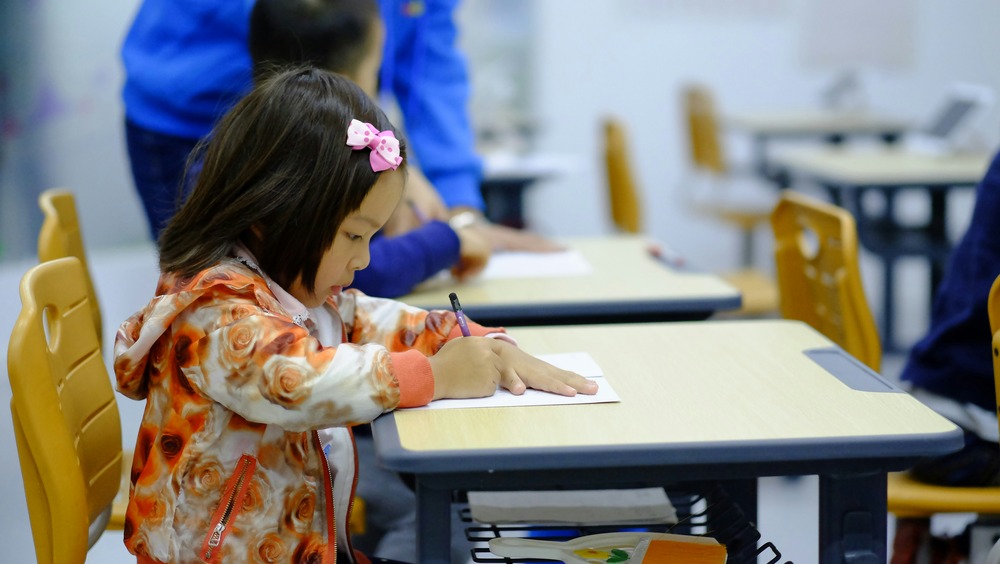
02 Jul Slow the Summer Slide with Math Summer Camp, and by Working Math into Daily Life
Beat the summer slide with ALOHA Mind Math’s Summer Math Camp program. It provides an accelerated version of our regular programs, for ages 5-12. Instead of coming once a week, students can attend daily, over a week. As always, classes are taught by our expert instructors. This math practice, with other students in their age-group, will help slow the summer slide by keeping them engaged in the learning process. According to several studies the summer slide is real, and kids often lose academic gains made during the school year.
How Does ALOHA’s Summer Math Enrichment Program Work?
Some students need summer math tutoring to help slow the “slide.” While other children love math and respond to the challenge of learning new things. Our program meets both needs. Your child will learn to use an abacus as well as mental math techniques in a small group of similar-aged learners led by an instructor. If already an ALOHA Mind Math student, your child will continue where they left off in their program, but build skills daily, instead of once a week.
Your child will practice techniques on the abacus that will include age-appropriate adding, subtracting, multiplication and division. We’ll introduce mind math techniques, where our students will amaze themselves and how much math they can do in their minds. Number sense activities and games round out this fun experience. Our programs also support classroom math learning. Your child will broaden his or her understanding of math and realize that they too can be math rock star!
Summer Math Programs Can Help Kids Develop More Than Math Skills They:
- Continue the Habit of Learning During Summer
- Help Enhance Cognitive Skills
- Promote Problem-Solving Skills
- Form Critical Thinking Skills
- Build Confidence
- Lead to Greater Academic Success
Parents Can Help Kids Recognize & Connect Math in Everyday Life
Math learning can feel very academic and disconnected from everyday experience for children. We are suggesting ways parents can weave math into daily living. Adults can make a game of getting their children to notice math that is all around them.
For example, although geometry is taught in middle school, learning shapes starts much earlier. Geometric shapes are all around us by way of engineering and construction, inside the objects we use, and the buildings we live, work and play in.
You can engage your child, inside the house, by helping them find shapes. For younger kids the cereal box is a rectangle, so is the butter, or breakfast toaster tart. Your morning muffin or bagel is a circle/ the cereal or soup bowl, and soup can are round/circular and have volume. The remote control is a rectangle the keyboard keys a,re squares, the tv is a rectangle.
This game can continue as you drive to the pool or grocery store – engineering and construction are full of math and shapes. Look at the triangle in your roof line, at the top of many city buildings, traffic cones and more. The diving board and pool are rectangles, as likely is the grocery store building itself. Car steering wheels and tires are circles. The bricks in many homes are rectangles, the siding is made up of elongated rectangles. Coins are round, your ATM card and bills are rectangular. Stop signs are Octagons, yield signs are triangles, street signs are rectangles.
Math is also integral to the things we buy. When you pay for something or take money out of an ATM – have your children help count the change. Once you unload the groceries, talk about how much each item costs and have older kids help you add the receipt up. The milk, cereal and blueberries cost X. The chicken, pasta, broccoli, and tomato sauce for tonight’s dinner cost Y.
If you use math in your job, or if you see math being used as you watch TV – engage your children in a discussion. There are studies that show that the more we can connect mathematical concepts to real-life situations the more it helps kids learn. In high school there is a trend where they teach kids about taxes, how to calculate the interest on a car loan or a mortgage.
parents can help their children see that learning math skills isn’t just for school, but that kids can take math out into the real world and use it in fun and helpful ways.
For a Concrete way to Slow the Summer Slide Explore ALOHA’s Summer Enrichment Camp Programs.
Although children are gaining ground back, for kids whose grade school was interrupted by the pandemic, the learning losses can be greater. For a teacher-led summer educational program, and a more structured way to keep your child’s summer learning high, look to places like an ALOHA Center near you. ALOHA Mind Math’s summer camp classes for elementary school children are geared to meet your child’s needs at their age group and level of learning. During our summer program in 2024, our teachers adapt to both the high achiever, as well as to the student who is struggling with math. We also have reading and writing programs too.
Written by Cathy Larkin, a freelance writer and social media coordinator, who has been a part of the ALOHA Mind Math team for several years.



Sorry, the comment form is closed at this time.